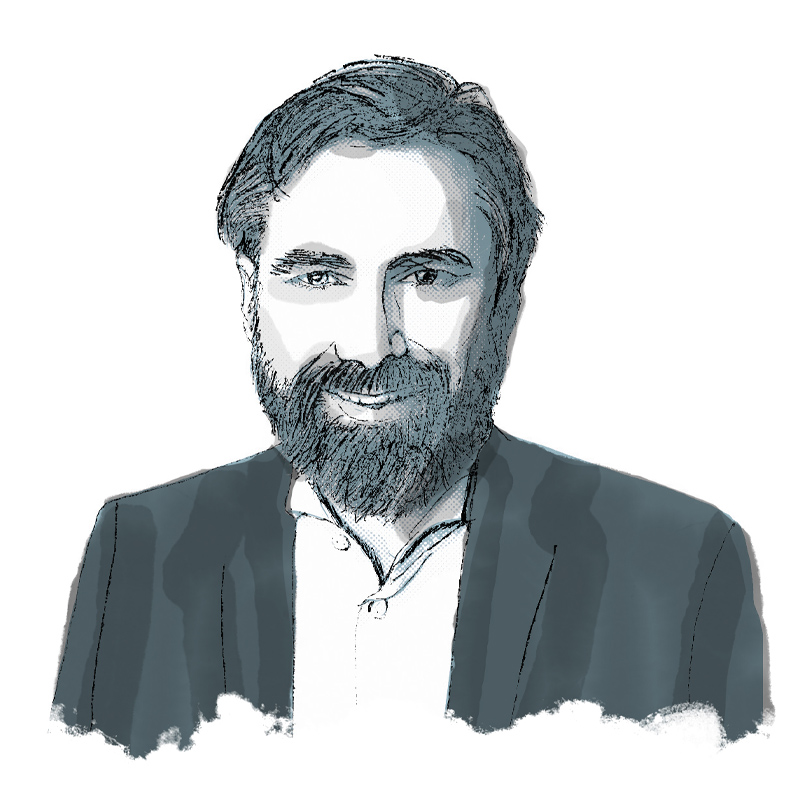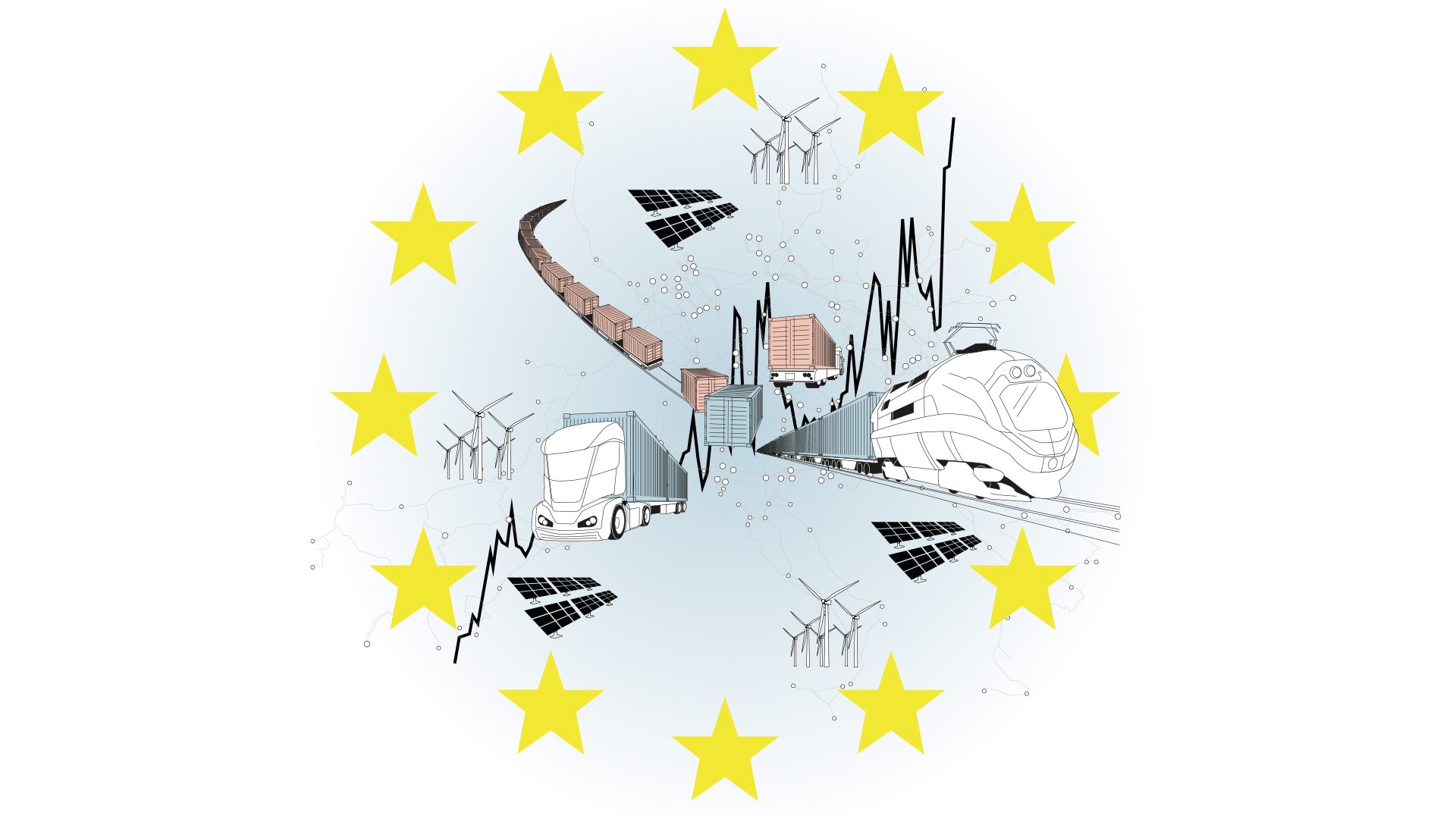“We are gradually becoming a power-dominated economy”
Protectionism and geopolitical tensions are threatening to undermine global trade. Germany is responding by introducing a growth-stimulus package of measures, the US Federal Reserve is in a quandary and the EU stands at a crossroads. KOF economists Heiner Mikosch and Alexander Rathke discuss what all of this means for Switzerland, where it is particularly vulnerable, what it can do now – and who benefits.
Interview: Daniel Ammann and Simon Brunner
Outdated policies are clearly making a comeback. A new protectionism is shaking up the global economy. What are the most serious consequences?
Mikosch: The loss of purchasing power is key. When countries shield their markets from competition, goods become more expensive, and that affects everyone. In addition, there is a considerable loss of efficiency because the benefits of the international division of labour are impaired.
Rathke: Exactly. No country can produce everything itself, and even attempting to do so reduces productivity, product diversity and innovation. And that clearly means less prosperity in the long term.
Mikosch: What is even more serious is that the rules of the economic game are changing. The winners are no longer those who produce the most efficiently but those with the best access to politicians. We are gradually becoming a power-dominated economy in which political connections are more important than competitiveness. Those who can secure special privileges for their industry or country in Brussels or Washington have won. This stifles innovation further and can prevent entire modernisation processes from happening.
How is the current situation affecting Switzerland specifically?
Rathke: Uncertainty is overshadowing everything. Investment is being postponed, recruitment plans are being shelved – nobody knows what will happen tomorrow, so it’s better to wait and do nothing.
Mikosch: Manufacturing industry has been hit particularly hard. Around 700,000 people work in this sector. It was already under pressure – not least because of the ongoing crisis in the German automotive industry, with which it is closely linked.
Rathke: However, it must be clearly stated that if global protectionism continues, it will cause a real loss of income across all sectors in Switzerland.
What can Switzerland do?
Mikosch: If there is a threat of major labour shortages, the federal government could extend short-time working to cushion temporary shocks. But you have to be careful. At what point does a temporary instrument become a permanent hidden subsidy? This is precisely where the danger lies.
Rathke: In terms of trade policy, the aim is to open up as many markets as possible in the long term. At the same time, we have to be realistic. A free-trade agreement with Vietnam or the Mercosur countries cannot replace privileged access to the European Union’s single market. The EU remains our most important trading partner. This relationship must be secured.

“Our low national debt is a strategic advantage. Switzerland is considered stable.”Alexander Rathke
Okay, let’s talk about the EU. How will it react to the current situation?Rathke: Two scenarios are conceivable: either it becomes more unified or it falls apart. Both are possible. But I am fairly optimistic. Germany’s growth package is a case in point. This will – at least potentially – stimulate growth.
Potentially?
Mikosch: Part of this package concerns defence spending. Although this is vital to security policy, it will have hardly any positive effects on the economy as a whole. You occasionally read comparisons with Silicon Valley, which is said to have emerged from military spending, but it is wishful thinking to believe that something similar could happen here and now.
The other part of the package consists of infrastructure investment. Could this boost the economy?
Mikosch: Absolutely. Germany has a lot of catching up to do – in transport, in digital technology and in human capital: the country invests less in education than the EU average. However, I take a critical view of funding infrastructure investment through debt.
Rathke: If the funds are used wisely, growth can certainly be stimulated. But we must not forget that this is still debt – a bet on the future.
Will Switzerland also be able to benefit from Germany’s fiscal package?
Rathke: Yes, if the economy improves in Germany we will also notice it here. Germany is still the main export market for Switzerland’s manufacturing industry.
Germany has relaxed its debt ceiling for its growth-stimulus package. Is this a viable option for Switzerland as well?
Mikosch: No. In Germany the funding of at least military spending can be justified by a security emergency. I don’t see any comparable emergency in Switzerland.
Rathke: Our low national debt is a strategic advantage. Switzerland is considered stable, has considerable fiscal headroom in the event of an emergency and benefits from a low cost of capital...
…but is grappling with an increasingly strong currency. Manufacturing industry is already being hit. Any further appreciation of the Swiss franc is likely to exacerbate the situation.
Mikosch: Yes, but you mustn’t forget that a strong currency also has advantages. Swiss industrial companies import many inputs – such as raw materials and semi-finished products – from abroad. These become cheaper with a strong franc. And consumers benefit too.
So will the Swiss National Bank (SNB) not intervene?
Rathke: In the past it would probably have weakened the franc to prevent inflation from falling below zero and thus outside the range defined by the SNB as price stability. This is now more difficult because the US has already accused it of currency manipulation. I therefore expect to see a rate cut in June – partly because of the impending economic slowdown.
Then we would be back to zero interest rates. Is this a problem because the SNB would then no longer be able to lower rates without entering negative territory?
Rathke: In the past the SNB has essentially based its monetary policy on two instruments: controlling short-term interest rates and intervening in the foreign-exchange markets. If one of these instruments is no longer available to the usual extent, the remaining one must take on its function. However, there is an effective floor for interest rates, above which investors begin to withdraw their money from banks and prefer to hold it in cash instead.

“Trump knows that if he goes too far, it will harm the US economy.”Heiner Mikosch
And the SNB’s American counterpart, the Federal Reserve (Fed)? What will it do?
Rathke: The Fed is under greater pressure than the SNB. In addition to price stability its mandate also includes the labour market. This dual mandate causes a dilemma: to combat inflation, it would have to raise interest rates; to create jobs, it would have to lower them. Trump wants to cut interest rates to boost employment. But his high import tariffs have increased inflationary pressures. If I had to venture a prediction, I would say that US interest rates will not fall much further by the end of the year.
Trump’s 90-day suspension of import tariffs ends on 9 July this year. What happens after that?
Mikosch: I suspect that ultimately only some of these tariffs will actually be introduced. Trump knows that if he goes too far, it will harm the US economy. He will probably apply the tariffs in a targeted way – for example against China or certain industries that he wants to bring back to the US. I fear that the pharmaceutical industry could also be affected…
Rathke: ...and that would hit Switzerland hard. Pharmaceuticals account for around half of our exports, and 23 per cent of these go to the US.
Are there any sectors in Switzerland that are benefiting from the current situation?
Rathke: Yes, the consulting industry is one example. Companies need to rethink their supply chains, adapt to customs duties and set up complex transfer-pricing systems. The financial sector can also benefit to some extent from higher volatility – at least as long as there is no systemic crash.
And, finally: protectionism was long considered outdated, so why is it now celebrating a comeback, even though its flaws are so obvious?
Mikosch: The economic doctrine that has prevailed since Reagan and Thatcher has long ignored its social consequences. It is true that the dismantling of government regulation, the opening of markets and the liberalisation of trade and capital flows have significantly increased global prosperity. But this model has also produced clear losers, and these losers are now rebelling.
Rathke: Anyone who has lost their livelihood as a result of globalisation – such as an assembly-line worker in Detroit or a machine operator in the Ruhr region – can hardly be comforted by macroeconomic prosperity statistics. They want their job back and so vote for the politician who promises them that.
Mikosch: Europe has tried to combat the social tensions of globalisation by, for example, expanding its welfare state. The US has not done this. However, redistribution to support the losers is the price that liberals have to pay in order to maintain social cohesion and economic openness.
About the person
Dr Alexander Rathke studied economics in Munich and has been head of the Swiss Economy section at KOF since 2023. His research focuses on inflation and monetary policy, economic history and the refinement of forecasting methods.
Dr Heiner Mikosch studied economics, philosophy and political science in Freiburg (Breisgau), Munich and Lille. He has been a researcher at ETH Zurich since 2007. He specialises in the international economy, forecasting methods and survey experiments. He is currently focusing on the continued development of the KOF Nowcasting Lab. He is also chairman of the Association of European Economic Research Institutes (AIECE).
Contacts
KOF Konjunkturforschungsstelle
Leonhardstrasse 21
8092
Zürich
Switzerland
KOF Konjunkturforschungsstelle
Leonhardstrasse 21
8092
Zürich
Switzerland
